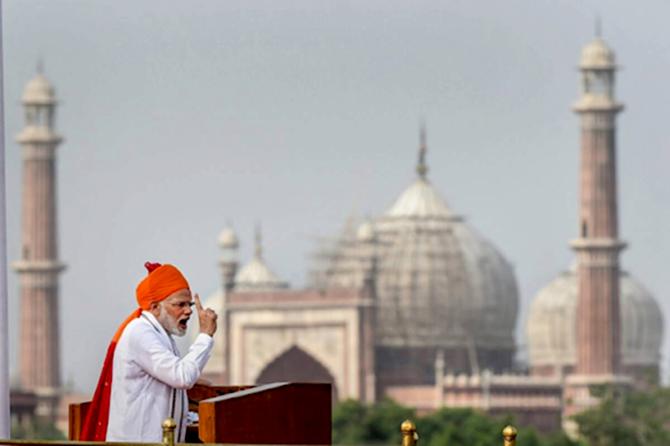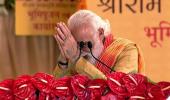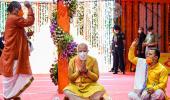India is too diverse to be governed centrally and with a single system.
The way forward is for the central government to keep the monopoly of military power and a share of national resources while the provinces must have greater autonomy, recommends Colonel Anil A Athale (retd).

As India celebrates the 74th Independence Day and inches towards the landmark 75th year, it is as good a time for some introspection.
One has recently heard laments about the death of 'Secular India' and the birth of a 'Hindu Rashtra'.
The occasion to cry wolf has been anchored on the recent happenings like the start of construction of the Ram temple in Ayodhya.
If one is to find a parallel, then according to these 'crying wolf' intellectuals, the reconstruction of the Somnath temple in 1951 should have been the occasion for the demise of 'Secular India'.
A more plausible explanation for the restitution of the Ram Janambhoomi to its rightful owner is correcting historical wrongs.
If one has to see the broader sweep of history of nearly 6,000 years, India has never been a religion-based nation.
The only exceptions to this rule were Ashoka the Great who expressly championed Buddhism as a State religion and later when Aurangzeb tried to forcibly Islamise India.
Both these were short lived episodes and like in Ashoka's case did not last beyond his life and failed in Aurangzeb's case.
The reason for this phenomenon unique to Indian civilisation is the very nature of the Indian plural ethos.
In broadly understood terms, Hinduism as a faith is actually an amalgamation of several 'religions' like the Saivaite, Vaishnav, Shakta (mother goddess cult) and atheists.
When there is no single book or single God, the concept of a Hindu Rashtra itself would be based on pluralism.
It is this spiritual pluralism that also explains the fact that while many poor and developing countries failed to survive as democracy, India became an exception.
These philosophical moorings of Indian democracy and secularism are not understood even by Indians who look at Indian reality through Western eyes.
Western political scientist Samuel Huntington believed that for democracy to thrive and survive it needed a high level of universal economic prosperity, an attribute that a desperately poor India lacked.
India defied the stereotype due to its civilisational heritage.
Many perceptive Indians (non-Hindu) believed that India was secular and democratic because it has a 'Hindu' majority.
Some Indian intellectuals credit the Constitution for Indian democracy and secularism.
These worthies forget that India got a democratic and secular Constitution because the Hindu majority wanted it that way.
Hindus are pluralist by DNA and not due to the Constitution.
For India to become a Hindu Rashtra, it has to deal with a 5,000-year-old historical and philosophical legacy.
Since attempts to make India into a Buddhist nation or an Islamic State have failed in the face of this deep-rooted Indian ethos, the narrow concept of a Hindu Rashtra that is ill defined is hardly likely to succeed and poses little threat.
The greater threat to the Republic comes from other quarters -- a tendency to over-centralise power.
Again, a look at our history shows that many Indian local identities are at least 5,000 years old.
The Great Mahabharat war (believed to have taken place in 3002 before CE) was fought between two coalitions.
The various kingdoms mentioned in that epic, Panchala (roughly corresponding to the current Andhra Pradesh and Telangana) or Sindh, exist to date.
Around these ancient identities, distinct culture and languages have evolved.
India is also home to the people belonging to the Caucasian, Astro-Negroid and Mongolian races.
I recall that during one armed forces course, which had many foreigners from Africa attending, an Indian was prevented by the sentry from attending a 'classified' lecture meant only for Indians.
The poor Indian officer from South India was mistaken for an African.
We have many instances where Indian citizens from the north eastern states are mistaken for Japanese or Chinese and asked to show their passports!
Many years ago, at a joint Indo-European Union seminar, where Indians from all four corners were present, an EU official openly admired India and openly wondered that if Indians can come together despite these vast differences, why can't Europeans?
There are factors like a common race and religion in Europe and yet the EU finds it difficult to stay united while India survives and thrives.
The biggest internal threat to India comes from this over centralisation harking back to the Ashokan empire.
It is very interesting that this importance to Emperor Ashoka is an entirely post-Independence phenomenon.
There was no mention of Ashoka during the long freedom struggle and he was never invoked either as an ideal or symbol of India.
To an extent, the 'discovery' of Ashoka can be credited to Jawaharlal Nehru.
The selection of Ashoka and his symbols for the fledgling Republic was done by Nehru so that he could stay away from any symbols that could be termed as 'Hindu'.
The equally extensive empire of Vikramaditya was ignored.
This fear of a Hindu revival so pervaded the new Republic that even after Independence no effort was made to unearth evidence of history at places like the Purana Quila in Delhi or in Ayodhya/Dwarka.
India under the Nehruvian thrall made no attempts to restore cultural links with Indonesia, Cambodia or Thailand.
The virtual deification and idolising of Ashoka had another damaging effect.
Every ruler from Nehru, Indira Gandhi, Atal Bihari Vajpayee to Narendra Damodardas Modi has wanted to emulate Ashoka in ushering in peace.
As opposed to the Ashokan model, the longest surviving and durable political model in the Indian subcontinent has been the Raj Mandala or Chakravarti model.
In this scheme of things, the central ruler kept overwhelming military power, but permitted regional players to exercise considerable freedom in administration.
Contrary to the popular but false notion, the British also followed this loose confederacy model.
The idea that the British united India is false as during their rule India was divided into close to 460 semi-independent princely states and several directly ruled provinces.
The British did not interfere in local customs and faith.
The model followed by British India is closer to the Chakravarti model of ancient India.
India is too diverse to be governed centrally and with a single system.
One size does not fit all.
The way forward is for the central government to keep the monopoly of military power and a share of national resources while the provinces must have greater autonomy.
This should be both symbolic (in terms of state flag and state song etc) as well as substantive in choosing the structures of governance suited to their genius.
The only restriction should be that these do not violate basic Fundamental Eights and freedoms guaranteed by the Constitution.
Within this ambit, the states should be free to experiment with governing structures suited to them.
To expect the same system to work in Tamil Nadu or Kerala or tribal dominated Nagaland or caste dominated Bihar is absurd.
The states must be allowed to find their own solutions to their own problems.
The Centre's role must be that of hand holding and not dictating.
This is a major change that we ought to start thinking about when we approach the milestone of the 75th year of Independence.
Herein lays the solution to many of India's internal problems from Kashmir to Nagaland to Naxalism!
Colonel Anil A Athale (retd) is a former Chhatrapati Shivaji Chair Fellow at the United Services Institute of India.
Feature Presentation: Aslam Hunani/Rediff.com










